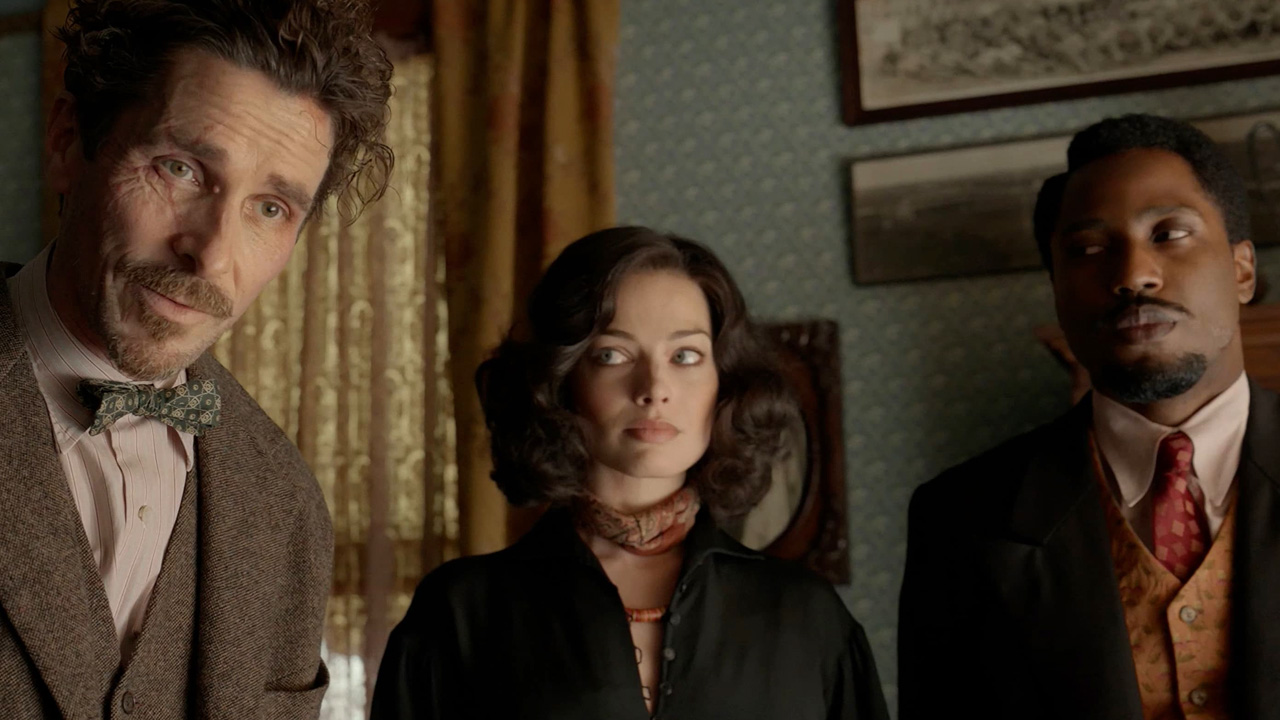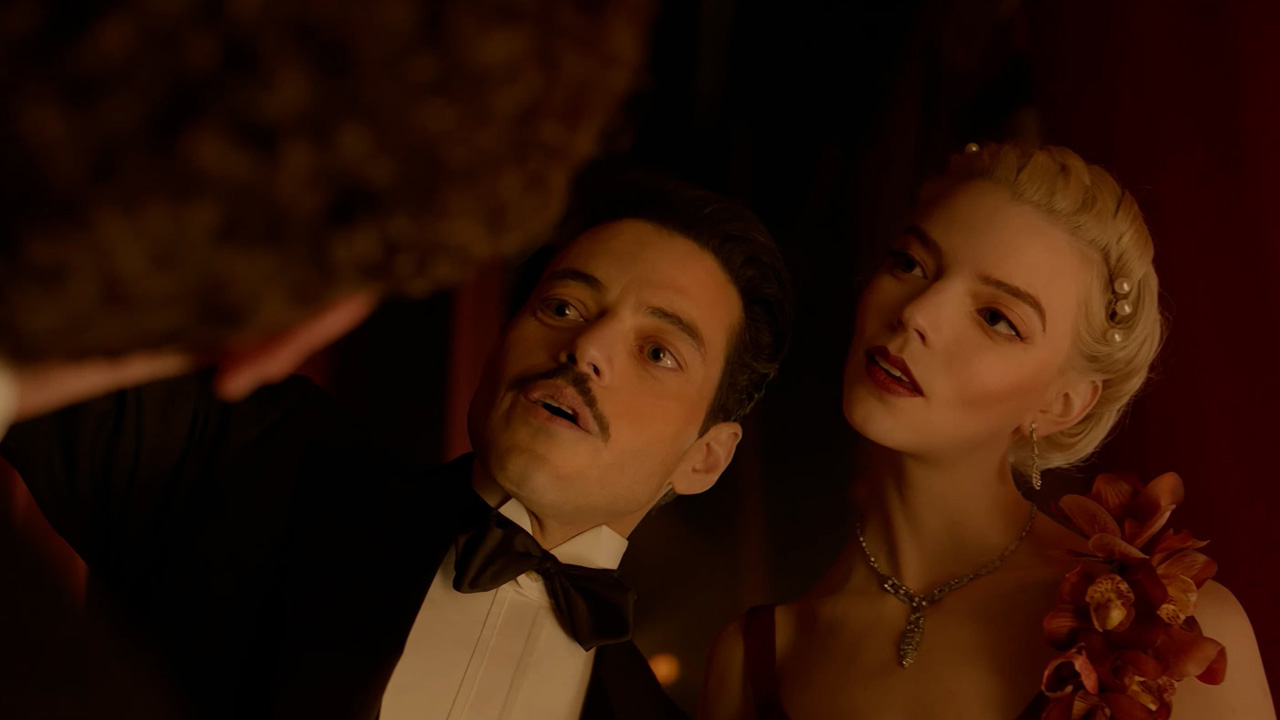Is Amsterdam the David O. Russell-est David O. Russell film yet?
For all its pedigree and pageantry, Amsterdam isn’t saying much at all.

Is period crime caper Amsterdam the David O. Russell-est film ever made? Travis Johnson reckons it might be, but not necessarily in a good way.
David O. Russell’s latest film bears all of his trademarks—for better and, frequently, for worse. His playfulness and his command of character and performance are on full display, but so too is his lack of narrative discipline and tendency towards obliqueness at the expense of clarity. It’s a shaggy dog story in the classic sense, only the dog in question is a bit of a mutt.
Which is a shame, because all the ingredients used are of the finest quality—it’s the recipe that’s flawed. Set in 1930s New York City, the film follows one-eyed, dope-happy doctor Burt Berendsen (Christian Bale), his old army buddy Harold Woodsman (John David Washington), and artist Valeria Voze (Margot Robbie) who, as a nurse back in the day, cared for the pair when they were wounded. The trio enjoyed an idyllic post-war period in Amsterdam (hence the title) where Harold and Valerie fell in love, before fate separated them.
Drawing them back together is the death of Senator Meekins (Ed Begley Jr. on “Kevin Costner in The Big Chill” duties), who was their commanding officer during the war. Burt’s autopsy indicates poisoning, but after he and Harold are framed for the murder of Meekin’s daughter (a brief cameo from Taylor Swift) their own lives are on the line. From there unfolds a twisty mystery involving nothing less than an attempted fascist takeover of the United States.
Which actually almost happened but was foiled when Marine veteran Smedley Butler, easily one of the most impressive men of the 20th century, told the fash where to go after they tried to recruit him to their cause and promptly shopped the conspiracists to Congress. The actual facts of the case are incredible, and it’s disappointing that Russell, who has previously brought plenty of real-world scenarios to the screen (The Fighter, American Hustle, Joy) has chosen to fictionalise events rather than adapt them–instead of Smedley Butler we get a sleepy Robert De Niro as expy General Gil Dillenbeck, and real-world drama is sacrificed in favour of farce and slapstick.
Perhaps that’s simply because Russell wanted to showcase his cast of seeming thousands; actors have flocked to his banner despite repeated allegations of poor on-set behaviour and worse besides, because the man is an Oscar factory. Jennifer Lawrence, Christian Bale, and Melissa Leo have all won acting Oscars under his direction, so it’s not surprising—although a little dispiriting—that he’s assembled such a stacked ensemble here. Chris Rock, Anya Taylor-Joy, Zoe Saldana, Mike Myers, Michael Shannon, Timothy Olyphant, Rami Malek, Andrea Riseborough, Alessandro Nivola, and Matthias Schoenaerts all show up at one point or another, some in the tiniest of parts; blink and you’ll miss Olyphant as an assassin.
Unfortunately, nobody seems to have a handle on how to treat the material apart from Bale, who clearly relishes going broad with his wacky, druggy doc, constantly having his glass eye go skittering across the floor (this makes two based-on-fact movies where Bale has played someone with a missing eye, the other being The Big Short). Everyone else does what they can, but while seasoned character actors like Michael Shannon and Mike Myers (playing American and British intelligence officers, respectively) can spin gold out of pretty thin straw, a lot of the cast seem at a loss as to how to pitch their performances (Anya Taylor-Joy and Rami Malek, playing a fashionable fascist couple, settle for “brittle”).

But at least there’s the plot, but that’s nigh-impenetrable, a tangled skein of conspiracy that might make sense on paper but on screen becomes just a series of vignettes. Perhaps this is intentional; Russell’s 2004 film I Heart Huckabees was an “existential comedy” that saw detectives Dustin Hoffman and Lily Tomlin big up the interconnected nature of reality on behalf of their angsty clientele (including Mark Wahlberg and Naomi Watts), and Amsterdam’s convoluted conspiracy vaguely echoes that intent, although to much lesser effect. If in I Heart Huckabees the pointlessness was the point, here it’s a distraction.
Russell does retain an eye for telling period detail, though. Real historical elements like the facial prosthetics used by wounded veterans (similar to Jack Huston’s disfigured assassin in Boardwalk Empire) and the forced sterilisation clinics operated by racists as a form of eugenics are fascinating, and the production design is as luxuriant and luminous as one could want from a decently budgeted Hollywood historical drama, but don’t really communicate the essence of the film. It’s difficult to parse the point Russell is making here. Certainly, there are parallels to be made between the historical events alluded to in Amsterdam and the Capitol Insurrection of January 6, 2021, but the film isn’t actually saying anything about it. Ultimately, for all its pedigree and pageantry, Amsterdam isn’t saying much at all—which might be the most David O. Russell thing about it.

























